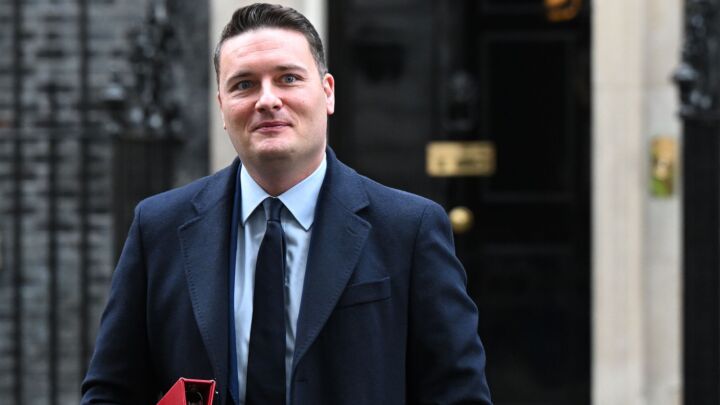How did we get from 9/11 to here?
From bin Laden to Saddam, Afghanistan to Iraq - homegrown problems have been exported abroad.

Want unlimited, ad-free access? Become a spiked supporter.
When it comes to the current US/UK war against Iraq, the daily bombardment of news and analysis leaves us none the wiser about what is going on now, why it is happening, and what the outcome might be. As the world watches, uncertain and perplexed, as events unfold, one key question is not being asked.
How did we get from 11 September to here?
How did we get from a major terrorist attack on New York and Washington to a war against Iraq? How did we get from a reactive ‘war on terror’ against the shady, stateless forces of Osama bin Laden’s al-Qaeda network to a proactive military campaign against the Iraqi nation state? How did we go from a world ordered around the multilateral institutions of NATO, the European Union and the United Nations to one where the USA and Britain end up going it alone?
One favourite theory doing the rounds is that of the ‘hawks conspiracy’. Ever since 11 September, the theory goes, certain members of the Bush administration have had their sights trained on Iraq, just waiting for the chance to push the button. But what we are witnessing now is anything but a concerted, conscious strategy by America to control the world. On the contrary: as each event has unfolded, things have spun further out of everybody’s control.
To understand how we got to here, it is necessary to look back to the time before 11 September. Because while these terrorist attacks certainly shook the world, 11 September was a catalyst for political developments that were already taking place. In that sense, it is kind of fitting that the USA should end up back where it was a decade ago: in the war-without-end in Iraq.
Culture of fear
The catastrophic attacks on the World Trade Centre and the Pentagon, by terrorists armed with passenger-laden jumbo jets, sent shockwaves through the world. But from the start, the significance of this event was not about the attack itself, but the reaction to it within the West.
The audacious attacks did not start a new wave of terrorism in the USA. It is worth reminding ourselves that, since 11 September, only one apparently similar attack has happened. And the bombing of a nightclub in Bali on 12 October 2002, killing around 200 people, was similar only in its apparent senselessness – the target being, not one of political or military significance, but young Western tourists on a night out. The consequence of 11 September has not been more terrorism, but a heightened sense of fear.
It is hard to speculate as to how America might have reacted to the events of 9/11, had these events taken place in a different time and context. But the way that it did react helps to make sense of the trends that we are witnessing now.
Anger was quickly replaced by upset, as a nation mourning its dead sought solace in tears and the comfort of friends. Confidence, about the ability of mighty America to deal with the nihilistic actions of a few individuals, gave way to a heightened sense of fear, as Americans feared a new attack around every corner.
Patriotism, in the sense of a nation coming together under the flag to unite against their foe, became a kind of shared national vulnerability, as the nation huddled together under its flag. And trust, in the ability of the political elite to lead a wounded America out of the rubble of Ground Zero, became panic, as Americans started to feel themselves even more estranged from their leaders and isolated in the world. The heroes of 9/11 were not the politicians, but the firefighters – not leaders, but those charged with sorting out the mess.
Within days, the reaction to 9/11 was shaped by the culture of fear: not only in America, but throughout the Western world. When certain commentators in the UK and Europe, and even within America, started asking ‘Did America deserve it?’, it was clear where the analysis was heading.
The terrorist attacks of 11 September were not viewed as an affront to all that the developed world has achieved and the values that we hold dear, but as the grimly inevitable outcome of a world gone wrong. The moral of this story was that the West has shaped the world in its image, and now the people of the West will pay for it with fear. Why was society so receptive to this view?
The politics of risk
The culture of fear is not a spontaneous reaction by the public to a truly dangerous world. The worldwide anthrax panic sparked by a handful of anthrax-related deaths in America shortly after 9/11 was not caused by a genuine and widespread mortal danger facing US and European citizens. Our propensity to panic about everything from child abductions to mobile phones does not come from the fact that modern life contains more risks than ever before – on the level of everyday reality, the opposite is the case.
The culture of fear comes from the top down. It comes from society’s leaders, and their inability to lead.
Over the past decade, the Western political elite has experienced a profound disorientation. The old framework of left and right, which shaped both the domestic political situation and the international world order, has long gone. In its place is an elite charged with running modern capitalist society, with all its problems and contradictions, and yet without its own vision of the future or an alternative to pitch itself against. Today’s political elite is painfully aware of the problems of society, with no vision about how these might be resolved. Enter the philosophy of risk consciousness.
Risk consciousness represents acquiescence to an imperfect world. It implies that society has problems that cannot be resolved, only managed. Today’s leaders, lacking a vision of the future, have come to view their role as the management of risk in the here and now. The strategy is not to solve the problems of society, but to contain them – often by an ever-closer regulation of individual behaviour.
Risk consciousness might be the logical outlook of an imperfect world with no alternative. As a political strategy for the ruling elite, however, it is fraught with problems. It is an entirely passive, negative philosophy, which, rather than attempting to unite people around an ideology or a cause, aims to scare them into submission by drawing attention to their individual vulnerability. And by setting up political leadership as the ability to contain risk, it exposes the inability of society’s leaders to deliver an entirely safe world. This was one sharp lesson of the ‘war on terror’.
The political reaction to 9/11 was an attempt to cohere both the citizens of America, and the Western world, around an appropriate response to the terrorist attacks. Bereft of any positive sentiment to appeal to, the US and other Western elites latched on to society’s receptiveness to fear.
From new security measures to official advice about dealing with terrorist attacks, from anti-terrorism legislation to grand statements about protecting the Western world from an ever-expanding ‘axis of evil’ abroad, there was a concerted attempt to use 9/11 to bring people together, and to use the need for protection as a way of boosting the legitimacy of their leaders
It didn’t work. Far from bringing people together, the emphasis on terror post-9/11 fuelled suspicion of others, and pulled people further apart. And far from providing Western leaders with a new role as protector in a risk-averse world, the strategy encouraged pre-existing cynicism and deepened doubts about the legitimacy of the elite.
Legitimacy crisis
One striking feature of our times has been the ever-widening gulf between society’s citizens and their political leaders. With no social alternative on offer, and no vision of the future readily available, the past decade has brought a growing disengagement between electorates in the West and the established political parties.
In the USA, the presidential election of 2000, with its dodgy ‘chads’ and media manipulation, brought the corruption of the US political system into the spotlight. Even now, George W Bush’s presidency is still viewed in some circles as illegitimate; an historical accident that never would have happened with better technology. Yet with nobody and nothing of interest in the Democrat camp, Bush dissenters have little political outlet for their opposition.
In the UK in 2001, Tony Blair’s New Labour party followed its 1997 landslide victory with another, based on the lowest electoral turnout for decades. The big shift in British politics has been the implosion of the Tory party, with the slippery insipidness of the Liberal Democrats taking place on the side. In 2001, Blair was it because he was there – but never had the British public been so unexcited about an election. Meanwhile, around Europe, speculation of far right parties taking advantage of political disengagement has accompanied collapsing regimes and corruption-ridden politicians. This is the bread-and-butter of traditional politics.
Across the Western world, the legitimacy of political leaders hangs in the balance. They have no vision, no programme, no reason to be there except for the will of the electorate. And the will of the electorate, such as it exists, involves casting a grudging vote for the one personality on offer. Is Iain Duncan Smith any alternative at all to New Labour? Where is Al Gore now? Vote for Chirac because we don’t want Le Pen. That’s as far, today, as engagement with mainstream politics goes.
The political elite knows this, and is terrified of its consequences. It cannot lead societies whose response to its leadership is, ‘Not in my name’. But its attempts to foster greater coherence tend to make things worse, by exposing its weakness and fuelling greater cynicism. The message of the domestic war on terror – in summary, ‘protect yourself’ – only adds to the notion that politicians can do nothing when it comes to keeping us safe from harm.
This level of mistrust is one reason why the culture of fear can hold today’s society so readily in thrall. Trusting nobody at the top, individuals’ isolation makes them very exposed to every new scare or panic – whether it is issued by the authorities, campaign groups, or anybody else. And the cynicism of politicians means that there is little antidote for these panics. A scared society may continually seek official reassurance, but increasingly, it does not trust this advice.
So hot on the heels of the anthrax panic came complaints that politicians were protecting themselves, without caring about postal workers or the American public to whom letters were delivered every day. When the British Army surrounded Heathrow airport in an apparent anti-terrorism measure, it was quickly dismissed as a propaganda stunt.
Fear does not make political leaders legitimate – it only makes the public more suspicious and scared. In this context, it is little wonder that US and European politicians, in reacting to 11 September, soon set their sights on Abroad.
National interest
Within the space of one month, the US reaction to 11 September took the form of dropping bombs on Afghanistan. The reasoning was spurious – from what was known of the 9/11 hijackers, they were Western-educated Muslims without obvious links to Afghanistan; and no organisation took responsibility for the terrorist attacks. But the inability to respond to 9/11 at home pushed the US elite outwards, to the bogeyman Osama bin Laden and his al-Qaeda network, which were presumably based in Afghanistan.
The Afghan campaign was a curious affair. Over the past decade, the strategy of compensating for waning legitimacy at home through the assertion of moral right and might abroad has been employed, with some success, by the Western elite. Think of Kosovo – Blair’s war of Good v Evil, widely perceived as ‘our’ mission to save ‘them’. Think back to the first Gulf War, and the Allied mission to save the Kurds (and the Marsh Arabs) from the evils of Saddam Hussein.
These military adventures were not driven by something so crude as the desire for votes, but nor were they driven by any obvious material or strategic interest. They were about the Western powers using the world as a stage to affirm their legitimacy at home, the world order internationally, and their relationships with each other.
The Afghan campaign, however, was not so straightforward. President Bush had the world behind him in his war on terror, and nowhere for that to go. Afghanistan – a likely suspect, and an easy target – could be seen as a useful focus for the reaction to 9/11, and a useful test of the world’s resolve. But from the start, the bombastic language contrasted sharply with the cautious, unsure approach to the war itself.
Within days of 11 September, many commentators voiced their fears about the danger of America lashing out against the world; and there was some surprise when that simply failed to happen. Bush carefully built an international base of support for military action in Afghanistan; and the campaign itself was marked, not by gung-ho destruction but by politically correct apologism. Remember the food parcels raining down in time with the bombs; the humanitarian concerns; the continual assurances that this was not a war against Islam?
While many were uncomfortable with the military campaign itself, PR-wise it seemed an appropriate reaction to 11 September – supposedly, a specific targeting of dangerous terrorists, acting as a warning to others that they ought to behave.
But the Afghan campaign was a mess. What started as a war for bin Laden’s head foundered when bin Laden was nowhere to be seen; what started as a war against stateless terrorists foundered when Afghanistan’s ruling Taliban regime refused to accept the war. So it became a war against the Taliban, more like the West-against-a-third-world-state conflicts of the past; and then it became a war of humanitarian liberation by default, in a way that made the humanitarian claims look like a PR add-on.
Ranged against a pitiful enemy of peasants in rags, the military still managed to get bogged down and commit unfortunate errors, like bombing Afghan wedding parties. Eighteen months on, and there is still no sign of bin Laden, no end to the fighting, and the original war aims have been revised so many times that they have been forgotten. Both in symbolic and practical terms, the Afghan campaign became a problem.
Which might possibly have been manageable – if it weren’t for Iraq.
Back to Iraq
Now the West’s most unpopular war has started, many are fond of arguing that the USA always had its sights on war with Iraq, whatever the UN inspectors managed to achieve. Clearly there are a few hawks in the Bush administration suffering from a case of Hussein-on-the-brain, and comments like Bush’s ‘we’re talking about the guy who tried to kill my dad’ do not help much.
But let’s be clear about one thing. Whatever the USA’s plans in relation to Iraq, the US administration never intended to embroil itself in a war that would split the UN Security Council, give the green light to third world countries to raise two fingers in opposition, estrange the voting public from the political elite, and lose the lives of US soldiers.
The crisis over Iraq is a product of the broader tensions of the modern world coming together around an issue that just so happens to be Iraq. It has nothing to do with Bush’s psychology, terrorist threats, the finer feelings of the French for the fate of the Iraqi people, or the principles of a new anti-war movement. It is about a homegrown crisis within the West being played out on the world stage.
For the past 12 years, Iraq has played a useful role as rogue state sans pareil. In 1991, after the demise of the Soviet Union’s ‘Evil Empire’, blasting Iraq was a focus for Western unity in a new, and more uncertain, world. This kind of unity, embodied in Western-led multilateral institutions like the UN and NATO, helped to contain tensions within the Western alliance and bring some sense of order and structure to international affairs.
All those now asking, bemusedly, why NATO did not finish off Saddam Hussein in the first place should know that, if Saddam Hussein did not exist, they would have had to invent him. The campaign against Saddam, with 12 years’ worth of multilateral bombing, inspecting and bullying Iraq, has helped to reaffirm the West’s coherence as a world police force. Over all this time, allied tensions have been contained through the recognised need for international control – and to have this control, you need a few rogues.
The dissidents on the UN Security Council had no problem with this. It has been in no Western nation’s interest to defend Iraq, to annoy America, or to cause any kind of rift in the Western alliance. We should note that the cry of the so-called anti-war lobby, from the French president to the protesters on the streets, is restricted to allowing more time for coercion-by-diplomacy.
The acceptance, in the West, of its need to control evil Iraq has not changed. What has changed is the extent to which various other tensions have come to prominence, allowing for a situation in which the broader stability represented by the Western alliance to appear threatened.
Take France. What’s in it for Chirac, in picking fights with America over a couple more months’ worth of weapons inspections? In the long-term world, very little. But in the short-term in France, Chirac’s barely legitimate presidency has undergone a major boost. No longer is he the man awaiting corruption trials who at least is better than Le Pen – he appears as a principled hero, standing up for plucky little France against the big bad USA.
If the pattern of the past 10 years was for Western regimes to deal with their legitimacy crisis at home by dropping bombs abroad, Chirac is doing the same thing by arguing against the bombs being dropped just yet.
And why can France get away with it? Because of the USA’s own sense of illegitimacy about heading up this unipolar world. For years, it has relied on the sanction of the UN to cover for its military adventures – for years, it has experienced a palpable discomfort about the consequences of directly exercising its power in the world. Hence the ascendancy of non-state actors and institutions, set up to take a diffuse and unaccountable responsibility for what happens in the world.
That is why Bush pleaded, procrastinated and backtracked all the way into the war against Iraq – having set it in motion with the assumption of Western support, there was little appetite for going it alone. When it came to it, the reason for pushing the button was a negative one. Having gone so far, there was no way back.
The USA’s sense of its own failure to deal decisively and successfully with the events of 11 September, and the experience of a messy and unconvincing war in Afghanistan, led both to the focus on Iraq and the reaction against the war on Iraq. The USA was propelled outwards and backwards, to attacking its safe-bet rogue state. In doing so, it revealed its weakness, prompting other nations to pick, parasitically, at America’s weakness for their own short-term gains.
These antics have been played out to the public, whose disenchantment with politics and immersion in the culture of fear makes them cynical and scared about any attempt by political leaders to exercise anything that looks like power. And the media, rumour-heavy and analysis-lite, has faithfully reflected the depth of confusion that characterises the current times.
That’s how we got from 11 September, to here.
Read on:
spiked-conference: Panic attack
spiked-issue: War on Iraq
spiked-issue: War on terror
spiked-issue: After 11 September
You’ve hit your monthly free article limit.
Support spiked and get unlimited access.
Support spiked and get unlimited access
spiked is funded by readers like you. Only 0.1% of regular readers currently support us. If just 1% did, we could grow our team and step up the fight for free speech and democracy.
Become a spiked supporter and enjoy unlimited, ad-free access, bonus content and exclusive events – while helping to keep independent journalism alive.
Monthly support makes the biggest difference. Thank you.










Comments
Want to join the conversation?
Only spiked supporters and patrons, who donate regularly to us, can comment on our articles.